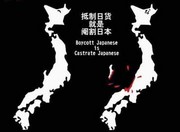From the Z+Blog (link):

I think Japan is a genuine wound. I see it in terms of humiliation just as much as the amount of deaths and suffering involved. Japan humiliated China in an almost unique way from the 1880s to the 1940s. Few people have ever gone through that kind of experience. With a wound like that, one can re-encourage or re-open types of historical memory. They can be suppressed or stimulated. Competitions in sports or economics can often lead into a re-evaluation of that past.
……Throughout the nineteen-teens and nineteen-twenties, they placed more and more political and economic demands on China that were not merely practical. They were uniquely humiliating and they eventually led to the outbreak of the big war in 1937. There was a consistent on-going attempt to bring China into a Japanese cultural orbit.
Of course other countries have experienced this but it was the prolonged nature and the concentration of it that made it all the worse. And then, added on top of all that was the previous grandeur of China’s imperial history and that made it all that much worse. The suffering was terrible and the behavior of troops was hideous. It was a savage and protracted war.
See also ESWN’s “Anti-Japanese print ads in China” (link, all picture files)







